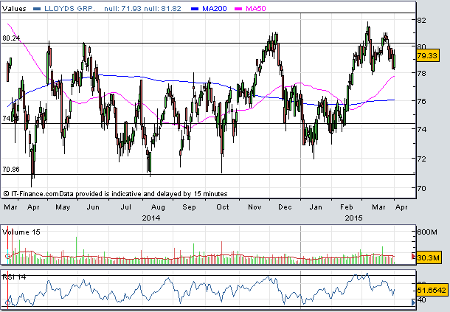Lloyds Banking attracts new upgrade
1st April 2015 09:52
by Lee Wild from interactive investor
Share on
A decision to begin paying dividends again has been instrumental in drumming up support in the City for shares. An inaugural dividend of 0.75p was flagged in February, but shareholders are told to expect much more in future. Share price underperformance over the past five months and the prospect of a fat payout has convinced Jefferies that "reward/risk is no longer asymmetric to the downside," and persuaded the broker to upgrade its rating on Lloyds.
"A progressively rising dividend (4.2p in '17E from 0.75p in '14) should provide support for LLOY's premium p/tbv [price-to-tangible book value] valuation, despite a persistently material gap between so-called 'underlying' and statutory earnings and lack of earnings upgrades," it says.
Lloyds made an underlying profit of £7.76 billion in 2014, up 26% as impairments fell by 60% and costs came by 2% to £9.4 billion. Including an extra £800 million of payment protection insurance (PPI) provisions in 2013 and last year's £710 million pension credit, statutory pre-tax profit surged fourfold to £1.76 billion

Since October, Lloyds has underperformed the Stoxx 600 sub-index of European banks by 9%. "We believe this under-performance should stop now that LLOY's premium price/tbv valuation (1.4x v sector on 1.2x) is backstopped by a dividend that should rise progressively, attracting income investors along the way (we now see a more meaningful dividend in 2015)."
Jefferies also thinks execution and tail risks are lower than average, and that the reward/risk on the shares is "more finely balanced now" - 12% base case upside; 14% downside in bear scenario and 24% upside in bull scenario.
As a result the broker upgrades the shares to 'hold' from 'underperform' and raises its price target from 69p to 88p.
However, Lloyds will have to do more if it's to get the full seal of approval. "The 'problem' with Lloyds is that consensus earnings expectations have been falling, even for the out years," explains Jefferies. "Specifically, cumulative 2014-2017E consensus net income estimates have fallen 24% since January 2014. Ultimately, we believe earnings upgrades will be needed to drive a re-rating and these appear hard to come by."
"In order to justify a 'buy', a further re-rating of the shares is required to make the reward/risk profile more asymmetric and, in the absence of earnings upgrades, we do not see Ke [cost of equity] falling below 9%. Our estimates already contemplate a robust 13% ROTE [return on tangible equity] in 2017E."
This article is for information and discussion purposes only and does not form a recommendation to invest or otherwise. The value of an investment may fall. The investments referred to in this article may not be suitable for all investors, and if in doubt, an investor should seek advice from a qualified investment adviser.